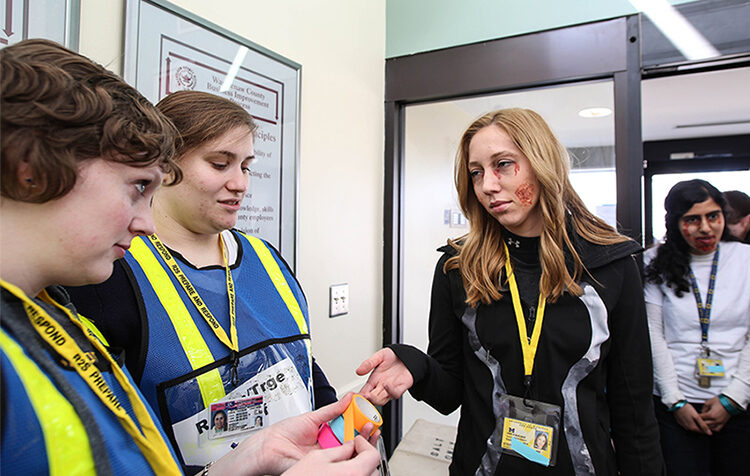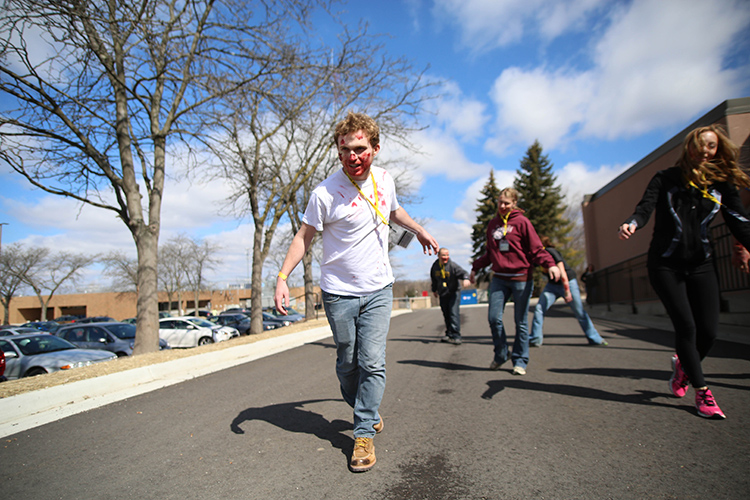
For the second year in a row, residents of Washtenaw County have survived another zombie invasion, thanks to the quick response of area public health leaders.
Students from the U-M School of Public Health and staff from the Washtenaw County Public Health Department and the Michigan Public Health Training Center came together during the Zombie Apocalypse Bite Back April 5 for a unique disaster preparedness exercise to save the county from the walking dead.
Zombies represent a worst-case scenario in public health: a natural disaster, major disease outbreak or bioterrorism. In this case, they were people infected with the T zombii parasite, contracted from eating contaminated lynx meat or by contact with a human who already had been exposed.
The symptoms were flu-like, that is until behaviors turned to aggression, biting, muscle twitches, an inability to walk normally and moaning, according to a fact sheet created by SPH students.
Of course, that same piece of literature carried the disclaimer: “This is a practice simulation, and zombies are not real.” Oh, and that parasite: it doesn’t exist.
Although meant to be a fun way to practice for a disaster the SPH students took their roles seriously.
“It might seem like it’s just a plaything but the zombie exercise is a practical way to practice the ICS,” said Chani Hodonsky, a master’s student in hospital and molecular epidemiology.
The ICS refers to the Incident Command System, an all-hazards approach to managing disasters, which was created by the Federal Emergency Management Agency. SPH students joined with health officials this year to battle zombies in an exercise that allowed the county to practice its ICS.
For the drill, a number of students in the class portrayed zombies while others, along with community participants, fulfilled various leadership roles in managing the disaster.
“The same principles that would be important in a zombie scenario are even more important in a real emergency,” said Matthew Shearer, student organizer of the event who will graduate in May with a Master of Public Health degree in epidemiology. “While you may have additional concerns during a zombie outbreak—chiefly, self-protection from the undead—you still need to be aware of your basic needs. Having non-perishable food, fresh water and first aid supplies are always a priority, but there are many other items that people may neglect to have readily available. For example, identification information/important documents (insurance, medical, etc.), extra prescription medication and extra clothes. It is also recommended that you have an escape plan with an identified meeting place for friends/family in the event that normal communications infrastructure is unavailable.”
You can learn a lot from a zombie
In fact, the students came up with two mantras for the exercise: “If You Are Ready For A Zombie Apocalypse, You Are Ready For Any Emergency,” and “Public Health Preparedness Starts With You.”
“That’s the idea we wanted to get across to people. Every American is involved in public health, and you actually have a role to play: to be aware and be prepared,” said Utibe Effiong, SPH master’s student in environmental health sciences and epidemiology.
“At the same time, it also is important for us to show the resources that are available to help,” his classmate Hodonsky was quick to add.
The Zombie Apocalypse, held for the first time last year on the U-M campus, was organized by Dr. Eden Wells, clinical associate professor of epidemiology, who wanted to give her students an action-based learning experience that was different from the usual drill.
“We adapted the zombie scenario from a Center for Disease Control and Prevention’s preparedness education campaign. While the scenario is not a real entity, its apocalyptic nature allows public health responders to test their ‘all-hazard’ emergency planning, which will have similar issues whether the emergency is a natural disaster or a bioterror event,” Dr. Wells said. “And the scenario grabs community attention—the audience we want to provide individual and family preparedness information to.”
Students enrolled in Dr. Wells’ Applied Epidemiology in Public Health Practice course assisted with the development and implementation of the exercise, working in partnership this year with WCPH. This included creating materials that outlined what people should do in such an emergency.
“It was really exciting to see students with no preparedness background and a love of epidemiology (and zombies) take on this challenge and pull it together over a semester,” said Cindra M. James, public health preparedness administrator for Washtenaw County Public Health. “I think it will send a message to everyone that being prepared can be fun and responsible, while watching a zombie’s flesh fall off.”
For the SPH students, the exercise provided something the traditional classroom could not offer.
“I’m learning in practical ways what the public health department role is, and that’s really important,” Effiong said.
“It’s one thing to get all of the training but another to get that call and just go,” Hodonsky said about not knowing until she arrived at the scene what role she would play. “It’s nerve wracking to think you don’t know what’s going to happen. You arrive and are assigned a duty. You follow directions very specifically.”
Photos by Marissa McClain, Michigan Photography




